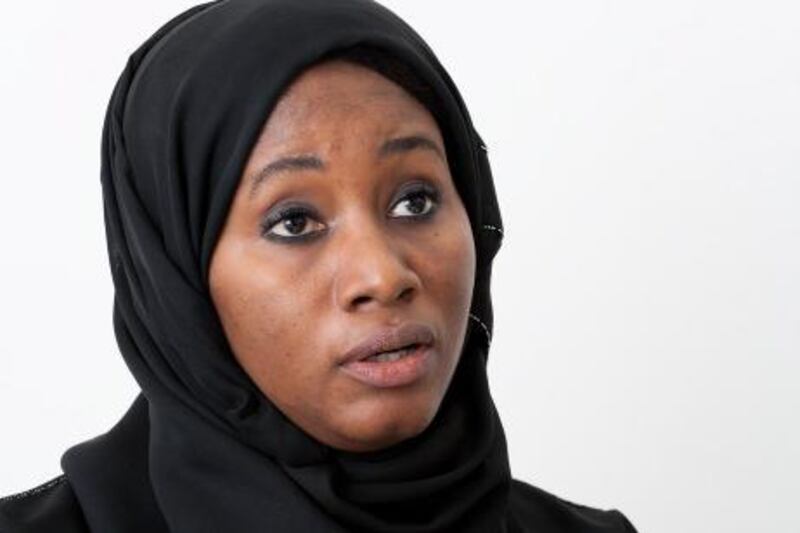DUBAI // When Tarifa Ajaif walks into an organisation with her goal of inspiring the staff, she does not use a white board and a marker. She uses Lego.
Managing director and founder of Go Glocal, a consultancy that offers motivational ideas to organisations by applying global approaches to local situations, Ms Ajaif, 33, strived to go beyond the boundaries of traditional teaching methods.
"I was looking for a method where we can enable youth to learn different theories," she said. "I noticed that when we usually tell them to develop their soft skills, we take them to another classroom and we lecture them, so we don't really teach them anything apart from the regular methods."
At first, it may seem odd that grown adults would be experimenting with Legos in a professional context. But Ms Ajaif said there is much to learn from the colourful plastic bricks.
The Lego training method, she said, allows individuals to express themselves through the objects they construct. For example, one project that clearly showed how this concept could highlight individual identities was the "duck ice-breaking activity".
"We gave everyone the exact same number and type of bricks and asked them to build a duck," she said. "Despite the fact that everyone's set of bricks was identical, each student still formed a different duck - demonstrating that everyone brings their own flavour to the team."
It all began in the autumn, when Ms Ajaif decided it was time to break the mould after working 12 years in higher education. "I believe in pragmatic education, that the hand-mind connection and out-of-the-box thinking adds more value to a learning experience than that of a classroom. I had one condition, however, this new method had to be something fun."
After coming across Legos, Ms Ajaif knew there was more to them than being children's toys. She contacted the Lego headquarters in Denmark and discovered they have a training programme, called Lego Serious Play, tailor-made for enhancing innovation and business performance.
Not wasting any time, Ms Ajaif immediately hopped on a plane to Denmark and became the one of the first certified Lego Serious Play facilitators in the Middle East.
"I saw international situations where the concept was implemented in the fields of health service, education and business," she said. "To me, Lego was always a tool for children. And to find out that it has different aspects that can bring the CEO of an organisation to the table to discuss real solid business ideas amazed me."
She then decided to package the product in a manner that would target four segments: children, students, social applications - such as special needs and counselling - and management.
"Organisations could use this method for team building by identifying individuals' characters. For example, those who believed in a solid foundation would use a solid base to place other objects on, and those who built a flower depict the need for a nurturing environment that allows their potential to blossom."
Ms Ajaif has worked with various universities and institutions such as the Dubai Women's College (DWC), the Sheikh Mohammad bin Rashid Women Leadership Program (WLP) and the Sharjah Business Women's Council, and both her students and collaborators have been intrigued by these non-traditional teaching methods.
Samia al Dahhan, the WLP program coordinator, said participants were impressed by Ms Ajaif's workshop. "We wanted something that tackled personal development and thinking styles, and we invited Tarifa to run a demo workshop with us," she said. "We truly enjoyed it. She showed us how to use different thinking styles to gain ideas by working as a group."
Sangeetha Thomas, a career counsellor at DWC, from which Ms Ajaif is a graduate, asked her to run a brief version of the workshop at the college's CAREERS department. Describing the workshop as "extremely innovative", Ms Thomas said that she was surprised to find the methodology quite complex and that it would work within organisations.
"It's a completely different experience, something that would stick to your memory."
However, Ms Ajaif said that the journey was not always smooth and that she did face challenges along the way. Also a mother, Ms Ajaif was reluctant to divulge personal information. "Every day, I have to face two stigmas - one of being a woman and the other of being an Emirati," she said.
Ms Ajaif said that stereotypes about her demographics, such as women prioritising family over work and the lack of Emirati commitment, did pose a challenge but only motivated her to dispel these preconceived notions.
"Instead, I try to be a role model for young women. And the government has played an important role in supporting us" she said. "I try to keep myself focused. Whatever the stereotype is, I do the opposite. For example, if a meeting is at 10am, I'll show up at 9:30. I hope that through my performance I will set a standard for others."
mismail@thenational.ae
Director uses Lego as a training tool
Children's toys used by company director as a way of enhancing innovation and business performance.

Editor's picks
More from the national




